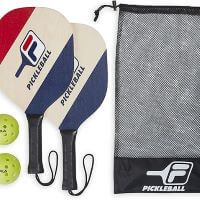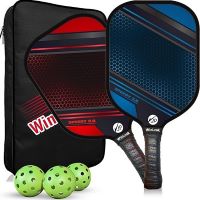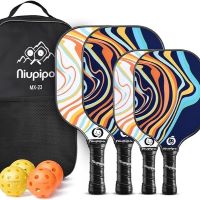Pickleball has gained immense popularity over the years, attracting players of all ages and skill levels. One of the appealing aspects of this sport is the concept of open play, which offers a flexible and inclusive playing environment.
Open-play pickleball provides an opportunity for players to come together, enjoy the game, and engage in friendly competition without the need for formal organization or structured play.
In this article, we will explore the rules, mechanics, benefits, and etiquette associated with open-play pickleball.
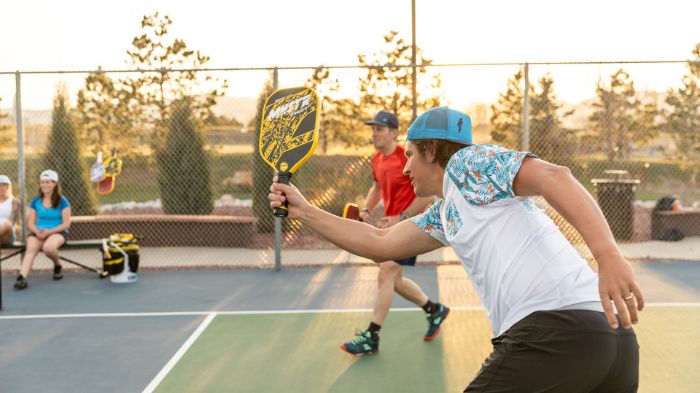
You Might Also Like:
What Is Open-Play Pickleball?
- Open play sessions typically take place at community centers, recreational facilities, or outdoor courts designated for pickleball. The availability of open play time may vary depending on the location and demand.
- Players can either reserve court time in advance or participate on a first-come, first-served basis. The duration of each session may be predetermined or based on the number of players waiting for their turn.
- During open play, players mix and match, forming teams or playing with different partners. This format encourages socialization and offers a unique opportunity to meet new people while honing your skills.
- Players self-organize games by grouping themselves into advanced pickleball doubles strategy or singles matches based on the number of players present. The rotation of players ensures that everyone gets a fair chance to participate and enjoy the game.
Benefits of Open Play Pickleball
- Inclusivity: Open play encourages players of all skill levels to participate, making it an inclusive activity for everyone. Whether you’re a beginner or an experienced player, open play allows you to join in the fun and improve your skills in a supportive environment.
- Accessibility: Open play sessions provide easy access to pickleball without the need for formal teams or scheduled matches. You can simply show up at the designated open play time and start playing, making it convenient for individuals with busy schedules or varying availability.
- Skill Development: Playing with a diverse group of players during open play exposes you to different playing styles and strategies. This helps improve your skills, adaptability, and overall understanding of the game. You can learn from experienced players and gain valuable insights to enhance your own gameplay.
- Socialization: Open-play pickleball offers an excellent opportunity to meet new people, socialize, and build connections. The friendly and inclusive atmosphere fosters a sense of community where you can bond with fellow players who share a common interest in the sport.
- Fitness and Recreation: Engaging in open play pickleball is a great way to stay active and fit. It provides a fun and enjoyable form of exercise that can improve your cardiovascular health, agility, and coordination. Additionally, the recreational aspect of open play promotes stress relief and overall well-being.
- Variety and Flexibility: Open play allows you to play with different partners and opponents, offering a variety of gameplay experiences. You can mix and match teams, try out different strategies, and enjoy the flexibility of playing as much or as little as you prefer during the open play session.
- Learning Opportunities: Open play provides a valuable learning environment where players can observe and learn from others. Whether it’s watching experienced players execute impressive shots or receiving tips and advice from fellow players, open play offers a platform for continuous learning and improvement.
- Enhanced Game Experience: Open play adds an element of spontaneity and unpredictability to the game. With varying skill levels and playing styles, every match is unique and exciting. This dynamic gameplay makes open-play sessions engaging and enjoyable for participants.
Rules for Open Play Pickleball
Court Rotation: In open-play pickleball, players are expected to rotate and switch partners regularly to ensure equal playing opportunities for everyone. When a game ends, players should step off the court and allow the next set of players to take their turn.
Scoring: Follow the standard scoring system of pickleball, which is typically a best-of-three games format. Each game is played to 11 points, and players must win by a margin of two points. During open play, it is customary to announce the score before each serve to keep all players informed.
Serve Order: Establish a fair and consistent pickleball power serve order among players. Some common methods include rotating clockwise or using a “stacking” system where new players join the game at the end of the serving team’s rotation. Agree on a method that works for all players to avoid confusion.
Non-Volley Zone (Kitchen) Rule: Respect the non-volley zone, also known as the kitchen. Players cannot hit the ball while standing inside the kitchen, except when the ball bounces in the kitchen or when they are volleying from behind the kitchen line. Avoid foot faults by ensuring both feet are behind the kitchen line during the serve.
Line Calls: Make line calls accurately and honestly. Players are responsible for making their own calls on whether a ball is in or out. In case of disagreement, it is customary to give the benefit of the doubt to the opposing team. Avoid arguing over line calls to maintain a positive and friendly atmosphere.
Sportsmanship: While open-play pickleball offers a more relaxed and informal environment, it is essential to adhere to proper etiquette and rules. Demonstrating good sportsmanship is crucial.
Show good sportsmanship throughout the game. Treat opponents with respect, refrain from engaging in unsportsmanlike behavior, and avoid disrupting the game with excessive celebration or negative reactions. Remember that pickleball is a game meant to be enjoyed by all participants.
Players should treat their opponents with respect, avoid unsportsmanlike behavior, and follow the rules of the game. It is important to communicate effectively with other players, particularly regarding court rotations and game preferences.
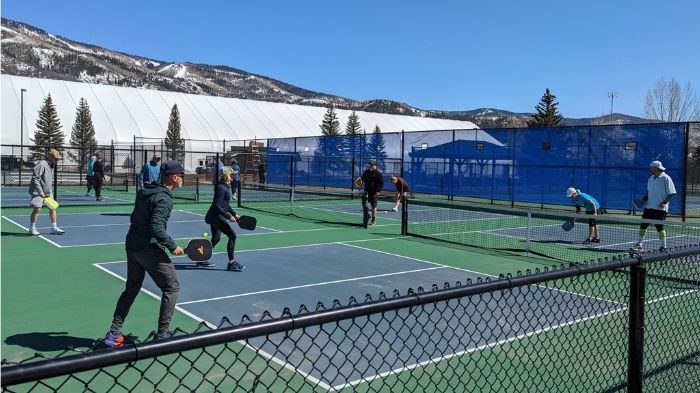
Communication: Effective communication is key to smooth gameplay. Clearly communicate your intentions, such as calling for a ball, switching positions, or signaling your partner during a rally. This helps to avoid collisions and confusion on the court.
Safety: Prioritize safety on the pickleball court. Be aware of your surroundings and the proximity of other players. Avoid swinging paddles or making sudden movements that could endanger yourself or others. Respect personal space and play with control to prevent accidents or injuries.
Equipment Use: Use your own paddle and equipment unless you have explicit permission to use someone else’s. Take care of your equipment and avoid damaging others’ paddles or balls. If you borrow equipment, return it promptly and in the same condition as you received it.
Court Time: Respect the allocated court time and be mindful of others waiting to play. Limit breaks between games to ensure fair rotation and equal playing opportunities for all participants. If others are waiting, it is courteous to finish your game promptly to allow the next players to start their match.
Remember, open-play pickleball is about enjoying the game, connecting with others, and maintaining a friendly atmosphere. By following these rules, you can contribute to a positive and inclusive pickleball experience for everyone involved.
Also Read: Pickleball Footwork
FAQs
In open play, players rotate and switch partners regularly, ensuring that everyone gets a chance to play with different individuals. When a game ends, players step off the court and allow the next set of players to take their turn. It promotes equal playing opportunities and encourages interaction among participants.
In open play, players rotate and switch partners regularly, ensuring that everyone gets a chance to play with different individuals. When a game ends, players step off the court and allow the next set of players to take their turn. It promotes equal playing opportunities and encourages interaction among participants.
No, you don’t need to bring your own partner for open play. The format allows players to mix and match partners during the session. It’s a great way to meet new people, connect with fellow players, and enjoy the game with a diverse range of playing styles.
Absolutely! Open play is open to players of all skill levels, including beginners. It provides a welcoming environment for newcomers to learn the game, improve their skills, and interact with more experienced players. It’s an excellent opportunity to get familiar with the sport and enjoy playing without pressure.
Yes, open play can accommodate competitive players as well. While it may have a more casual and friendly atmosphere, open play allows competitive players to hone their skills, test their strategies, and engage in challenging matches with players of varying skill levels. It offers a balance between competitiveness and enjoyment.
Let’s Wrap Up
In a nutshell, open-play pickleball is all about having a blast on the court while embracing players of every skill level. It’s a laid-back and friendly way to enjoy the game without any formalities. You can meet new friends, improve your skills, and become part of a lively pickleball community.
So why wait? Grab your paddle, join an open play session, and get ready for a whole lot of fun and excitement. Open play is where the real pickleball magic happens.

